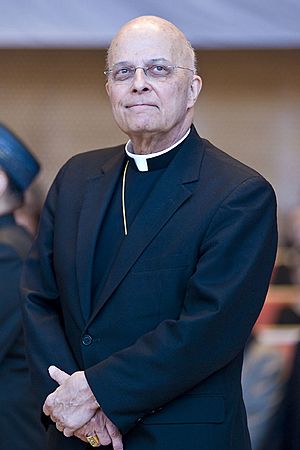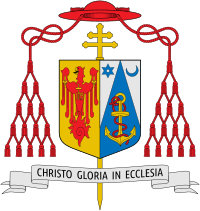Francis George facts for kids
Quick facts for kids His Eminence Francis Eugene George OMI |
|
|---|---|
| Cardinal, Archbishop Emeritus of Chicago |
|

Cardinal George at the May 2011 inauguration of Mayor Rahm Emanuel
|
|
| See | Chicago |
| Appointed | April 8, 1997 |
| Enthroned | May 7, 1997 |
| Reign ended | November 18, 2014 |
| Predecessor | Joseph Bernardin |
| Successor | Blase J. Cupich |
| Other posts | Cardinal-Priest of S. Bartolomeo all'Isola |
| Orders | |
| Ordination | December 21, 1963 |
| Consecration | September 21, 1990 by Agostino Cacciavillan |
| Created Cardinal | February 21, 1998 |
| Rank | Cardinal-Priest |
| Personal details | |
| Birth name | Francis Eugene George |
| Born | January 16, 1937 Chicago, Illinois, U.S. |
| Died | April 17, 2015 (aged 78) Chicago, Illinois, U.S. |
| Buried | All Saints Cemetery, Des Plaines, Illinois |
| Nationality | American |
| Denomination | Roman Catholic |
| Parents | Francis J. and Julia R. (nee McCarthy) George |
| Previous post |
|
| Motto | Christo Gloria in Ecclesia (To Christ be Glory in the Church; c.f. Ephesians 3:21) |
| Coat of arms |  |
| Styles of Francis George |
|
|---|---|
 |
|
| Reference style | His Eminence |
| Spoken style | Your Eminence |
| Informal style | Cardinal |
Francis Eugene George (January 16, 1937 – April 17, 2015) was an important leader in the Catholic Church in the United States. He was a member of a religious group called the Missionary Oblates of Mary Immaculate. He served as the eighth Archbishop of Chicago from 1997 to 2014. Before that, he was a bishop in Yakima and an archbishop in Portland.
In 1998, Pope John Paul II made him a cardinal. Cardinals are high-ranking officials in the Catholic Church who advise the Pope. From 2007 to 2010, he was the president of the United States Conference of Catholic Bishops (USCCB), which is a group of Catholic leaders in the U.S.
Cardinal George was diagnosed with cancer in 2006. He passed away from the disease in 2015.
Contents
Biography
Early Life and Education
Francis George was born in Chicago, Illinois, on January 16, 1937. His parents were Francis J. and Julia R. George. He had an older sister named Margaret. He went to a local Catholic school in Chicago.
When he was 13, Francis got polio, which caused him to have a permanent limp. Because of his limp, he was not accepted into one seminary (a school for training priests). Instead, he went to St. Henry Preparatory Seminary in Illinois.
He joined the Oblates religious group in 1957. He continued his studies at different seminaries, including one in Canada, where he studied theology (the study of religious faith).
Becoming a Priest
On December 21, 1963, Francis George became a priest for the Oblates. He earned several degrees, including a Bachelor of Theology and a Master of Philosophy.
He taught philosophy at different universities from 1964 to 1973. He also earned a Doctor of Philosophy degree and a Master of Theology degree during this time.
From 1973 to 1986, he served as a leader for the Oblates, first in the Midwest and then as a "vicar general" in Rome. A vicar general is a high-ranking official who helps lead the entire religious order. He earned another doctorate degree in 1988.
Bishop of Yakima
On July 10, 1990, Pope John Paul II chose Francis George to be the fifth Bishop of Yakima, Washington. A bishop is a spiritual leader who oversees a specific area called a diocese.
He officially became a bishop on September 21, 1990. His motto as a bishop was Christo Gloria in Ecclesia, which means "To Christ be Glory in the Church" in Latin. He served as bishop of Yakima for about five and a half years.
During this time, he was also involved with the USCCB, working on committees related to evangelization and Hispanic affairs. He also advised groups for people with disabilities.
Archbishop of Portland
On April 30, 1996, Bishop George became the ninth archbishop of Portland, Oregon. An archbishop leads a larger area called an archdiocese. He was installed on May 27, 1996.
During his time in Portland, he helped the archdiocese respond to a situation where a prisoner's private confession was recorded. A court later ruled this recording was against the law.
Archbishop of Chicago
On April 8, 1997, Pope John Paul II appointed Archbishop George as the eighth archbishop of Chicago. This was special because he was the first person born in Chicago to become its archbishop. He was installed on May 7, 1997.
On January 18, 1998, Pope John Paul II announced that Archbishop George would become a cardinal. He officially became a cardinal on February 21, 1998, in the Vatican.
As a cardinal, he participated in two important events called papal conclaves. These are meetings where cardinals gather to elect a new Pope. He helped choose Pope Benedict XVI in 2005 and Pope Francis in 2013.
From 2007 to 2010, Cardinal George served as the president of the USCCB.
Viewpoints
Interfaith Relations
Cardinal George believed in good relationships between different religions. In 2007, he spoke about how important it was for Catholics and Jewish people to understand each other better. He also spoke out against comments that denied the Holocaust happened.
Religious Freedom
In 2010, Cardinal George spoke at Brigham Young University about the importance of different religious groups working together to protect religious freedom. He believed that religious freedoms were very important in society.
Extra-Diocesan Posts
Vatican Appointments
Pope John Paul II appointed Cardinal George to several important roles within the Roman Curia, which are the administrative offices of the Vatican. These roles involved working on matters related to worship, religious life, and spreading the Catholic faith.
In 2010, Pope Benedict XVI also appointed him to a special commission to study the financial and organizational issues of the Holy See (the Pope's central government).
U.S. Conference of Catholic Bishops
Cardinal George was very active in the U.S. Conference of Catholic Bishops (USCCB). He served as its vice president from 2004 to 2007 and then as its president from 2007 to 2010. He worked on many committees, including those for doctrine, liturgy, and missions.
He also represented the USCCB at several World Synods of Bishops, which are meetings where bishops from around the world discuss important topics.
Catholic Organizations
As archbishop, Cardinal George was the leader of the University of St. Mary of the Lake/Mundelein Seminary in Illinois. He also served on the boards of many other Catholic organizations, including the Catholic University of America and the National Catholic Bioethics Center.
He was also involved with groups that supported Catholic campus ministry and people with disabilities.
Associations and Honors
Cardinal George was a member of several academic and religious associations. He received an honorary doctorate degree from Lewis University in 2014. On December 10, 2014, he received the Medal of Merit, which is the highest honor given by the City of Chicago.
Retirement and Final Illness
On January 16, 2012, Cardinal George submitted his resignation as archbishop of Chicago to Pope Benedict XVI, as he had reached the age of 75, which is the mandatory retirement age for bishops.
In 2006, Cardinal George was diagnosed with bladder cancer. In 2012, the cancer returned and spread. He underwent chemotherapy and other treatments. In March 2014, the cancer returned again, and he continued treatment.
In August 2014, he joined a study for a new cancer treatment drug. However, he left the study at the end of 2014 because it wasn't helping. In January 2015, he announced that he would receive palliative care, which focuses on comfort rather than a cure.
On September 20, 2014, Pope Francis accepted Cardinal George's resignation. Bishop Blase J. Cupich was named as his successor. Cardinal George passed away from cancer on April 17, 2015, at the age of 78.
Memorial Services
A funeral mass for Cardinal George was held on April 23, 2015, at Holy Name Cathedral in Chicago. He was buried in the George family plot at All Saints Cemetery in Illinois. Many important religious leaders attended his funeral.
A memorial mass was also held for him in Rome on April 25, 2015.
Legacy
Tributes
Many people shared their thoughts and tributes after Cardinal George's death. The Cardinal Secretary of State, Pietro Parolin, sent a message of sympathy.
Archbishop Joseph Kurtz, who was the president of the USCCB after Cardinal George, praised his leadership. Many bishops and archbishops who had worked with him also sent their condolences.
Illinois Governor Bruce Rauner also shared his respects.
Canonization
After his death, there was a request to begin the process for Cardinal George to be recognized as a saint in the Catholic Church. This process is called canonization. The earliest this could officially begin was in 2020.
Images for kids
See also
 In Spanish: Francis George para niños
In Spanish: Francis George para niños
- Catholic Church hierarchy
- Catholic Church in the United States
- Historical list of the Catholic bishops of the United States
- List of Catholic bishops of the United States
- Lists of patriarchs, archbishops, and bishops
 | Janet Taylor Pickett |
 | Synthia Saint James |
 | Howardena Pindell |
 | Faith Ringgold |


